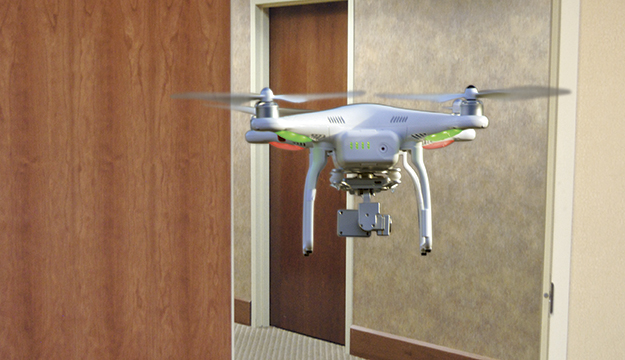
Virginia Governor Terry McAuliffe (right) looks on as Coeburn instructs Appalachian Regional Commission Chair Earl Gohl on the finer points of drone piloting. Photo courtesy Mountain Empire Community College
By Scott Robertson
When Fred Coeburn got into flying model airplanes as a hobby, he had no idea it would lead to an opportunity to bring an entire industry cluster to a region desperately in need of economic diversity. Yet somehow that’s what has happened.
Coeburn teaches a course listed in the Mountain Empire Community College (MECC) catalogue as AVI-195, Introduction to Unmanned Aerial Systems. In another time or another place, Coeburn’s drone course might be the equivalent of Underwater Basket Weaving at Berkeley, a harmless bit of fun masquerading as academia. In Southwest Virginia circa 2017, however, Coeburn’s course is the vanguard of an effort to bring new skills to a workforce in search of work.
The tobacco- and coal-based economies that had kept much of Southwest Virginia’s population gainfully employed since settlers moved west from Jamestown have failed. However, both the public and private sectors have latched onto Coeburn’s drone program as a possible first step in bringing unmanned systems construction and operations jobs to help fill the gap.
Coeburn said the credit for the creation of the drone program goes to Jack Kennedy, Wise County court clerk. “He decided drones, this nascent technology, were going to take off, and that Southwest Virginia should try to make itself a hub of drone manufacturing technology.”
Kennedy met with Matt Sweeny and Tom Bass, the owners of Flirtey, a drone company already making commercial deliveries in Australia. In July 2015, Flirtey became the company to make the first FAA-approved delivery on U.S. soil, shipping medical supplies to a remote area medical clinic in Wise County.
The next step involved bringing Virginia Tech and NASA into the picture, which in turn led to Aurora Flight Sciences sending a Centaur drone (wingspan: 44 feet) full of medical supplies to Wise County, where those supplies were then loaded into Flirtey’s smaller drone for the last leg of the journey. The drone that made that delivery is now in the Smithsonian’s Air and Space Museum.
At that point, Coeburn started teaching his course, creating a potential workforce on spec, essentially, while the region had the attention of Flirtey, Aurora and virtually every other company involved in unmanned flight. “If you don’t have the people trained, then those companies won’t ever come,” Coeburn said. “So I got together with Matt and Tom at Flirtey and started throwing ideas at them and between us we designed the course.”
Coeburn has been offering AVI-195 at MECC for two years now, teaching students how to take a bag of parts and turn it into a drone. “We want these students to be technicians and maintenance people. So they have to learn to create a drone from parts. The idea is full immersion in drone technology, from soldering to programming to piloting.”
The AVI course prefix implies aviation. Coeburn, however, saw more opportunities if the college doesn’t rule out unmanned terrestrial and aquatic vehicle training, so the next level of courses will have a UMS prefix for “unmanned systems.”
The endgame of all this coursework, though, is employment. And by creating the beginnings of a drone-trained workforce, Coeburn and MECC did what they set out to do.
Aurora Flight Systems, which had flown the Centaur drone for the remote area medical clinic mission, announced in August it would begin regular Centaur operations at Lonesome Pine Airport. “Aurora is poised to ensure Virginia takes the lead in the introduction of large unmanned aerial systems operating in the National Airspace System, and Wise County would be a great place to expand our capabilities and create jobs,” said Jeff Harlan, Centaur program director at Aurora.
When Aurora committed to creating jobs in Wise County, it proved the college program was more than just a class about a hobby. The Appalachian Regional Commission quickly approved a $2.2 million grant to the Wise County Industrial Development Authority to fund the Virginia Emerging Drone Industry Cluster Project. An ARC release said, “funds will be used to position five counties in southwestern Virginia as a national destination for the development of a drone-operator workforce to support the emerging drone industry… The award will train 64 new workers, leverage $15,000,000 in additional investment, and enable a private aerospace company in the region to perform work on a major contract – thereby creating 210 new direct and indirect jobs.”
Those jobs can be filled by retrained former miners or by young students who might otherwise leave the region. From Fred Coeburn’s hobby, a model of how to diversify and grow a stagnant economy has risen.





